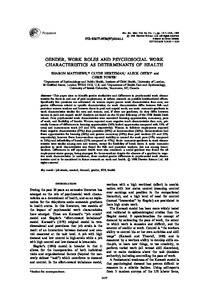Gender, work roles and psychosocial work characteristics as determinants of health

Matthews, Sharon ; Hertzman, Clyde ; Ostry, Aleck ; Power, Chris
1998
46
11
1417-1424
employment status ; gender ; psychosocial risks ; health status ; women
Gender equality & Women
English
Bibliogr.
"This paper aims to identify gender similarities and differences in psychosocial work characteristics for those in and out of paid employment, to inform research on possible health-related effects. Specifically five questions are addressed: do women report poorer work characteristics than men; are gender differences related to specific characteristics; do work characteristics differ between full- and part-time women workers and between those in paid and unpaid work; are socio–economic gradients in work characteristics similar for men and women; and, if there are gradients, do they differ between women in paid and unpaid work? Analyses are based on the 33 year follow-up of the 1958 British birth cohort. Four psychosocial work characteristics were examined: learning opportunities, monotony, pace of work, and flexibility of breaks. Women reported more negative work characteristics than men, primarily because of differences in learning opportunities (26% lacked opportunity compared with 13% of men) and monotonous work (47 and 31% respectively). Women in full-time employment reported fewer negative characteristics (27%) than part-time (39%) or home-workers (36%). Home-workers had fewer opportunities for learning (36%) and greater monotony (49%) than paid workers (21 and 22% respectively), however fewer home-workers reported inability to control the work pace (11% compared to 23%) and inflexibility of breaks (21% compared to 47%). Socio–economic gradients in work characteristics were similar among men and women, except for flexibility of break times. A socio–economic gradient in work characteristics was found for full- and part-time workers, but not among home-workers. Differences in self reported health were also examined: a social gradient was found for all employment status groups, being strongest for home-workers despite the absence of a gradient in negative work characteristics. In conclusion, these marked gender differences in psychosocial work characteristics need to be considered in future research on work and health. "
Digital
The ETUI is co-funded by the European Union. Views and opinions expressed are however those of the author(s) only and do not necessarily reflect those of the European Union or the ETUI.